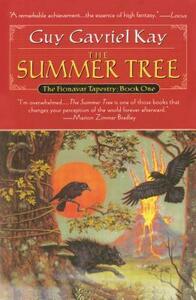Take a photo of a barcode or cover
Spoiler
And once they arrive in the other world, they immediately join society and court in meaningless frivolity, without any hint to their purpose of being there in the first place.I enjoyed that Kay used Toronto as the earth backdrop for the early portion of The Summer Tree and as always Kay's writing is beautifully descriptive and well balanced. Though at times those descriptive passages can drag on.
At moments throughout this book I had flashbacks to the Narnia series and Lord of the Rings. A group of friends traveling to an alternate world, being transformed by that world, and becoming integral to that world's survival readily leads itself to comparison to C.S. Lewis. However the world of Fionavar is much darker than Narnia and Kay has gone to great lengths to create a world with distinct clans, forms of magic, and traditions.
I will probably continuing reading the series out of curiosity and I am hoping the series develops into something more than a generic epic fantasy.
I know Toronto so much more than when I read this in paper years ago. So I can now picture all the Toronto locations in sharp detail. I had also not really internalized the age of the book - the characters are my parents' age.
The time shows through at this stage - the women's part feels a little underwritten in 2017, though it was pretty progressive for it's era.
On this read, it struck me how swiftly and completely our Canadians buy into the world of Fionavar. They have 24 hours warning that they're going to spend two weeks in a medieval fantasy world, but no one takes the recipe for gunpowder, stainless steel or penicillin. If there's occasional travel between worlds, why hasn't Loren Silvercloak done any of these things? I mean, clearly, because it's not that kind of story - more grown up Dark Is Rising than Connecticut Yankee in King Arthur's Court - but it bugged my gamer's brain a little. Where's Fionavar's Corwin?
Still, relatively minor nitpicks. This is a classic for a reason, and that it's starting to show its age at around 40 years old is not unreasonable.
The audiobook production has one glaring problem - the reader, Simon Vance, doesn't know what Torontonians sound like. They all have this odd, gruff, clipped accent that sounds more Minnesotan than the mushed consonants of Hogtown.
Not sure if I want to continue this series just yet
Guy Gavriel Kay helped Christopher Tolkien edit The Silmarillion and read bedtime stories to J. R. R.'s grandchildren. He came to the genre with credentials. Here, in his first novel, you can see a lot of the themes, trademarks and stylistic idiosyncracies that have made him one of my favourite writers. However, this is probably my least-favourite of his books (there's one other contender,but we'll get to that in a few more books) because there is so much of what I love about Mr Kay's writing still developing here and feeling a little clumsy compared to what is to come.
He commits the debut novelist's sin of throwing everything at the wall at once and hoping that it all sticks: one of the really memorable things about Kay's writing is how he creates characters who deliver arched, layered, incredibly subtextual lines and comebacks and makes it seem effortless and totally believable. Here we have a bunch of university students with an utterly amazing body of life experience and wisdom between them managing to completely subvert and undermine a centuries-old kingdom chockful of intriguers and schemers. It does feel a little hard to swallow.
But everything else is just sublime: Kay manages to create a believable world and history that has more than a few echoes of Tolkien's original creation. It feels a little less luminal than Middle-earth, but no less wondrous and astonishing for it. As a Tolkien-esque homage (because there is too much originality here for it to be a rip-off, but enough of the serial numbers remaining for it not to be completely unique), it is astonishing: as a creation in its own right, the quality of the writing and the thoughtfulness that has gone into the motivation and history of the cast lifts it far above so many of Kay's contemporaries.





